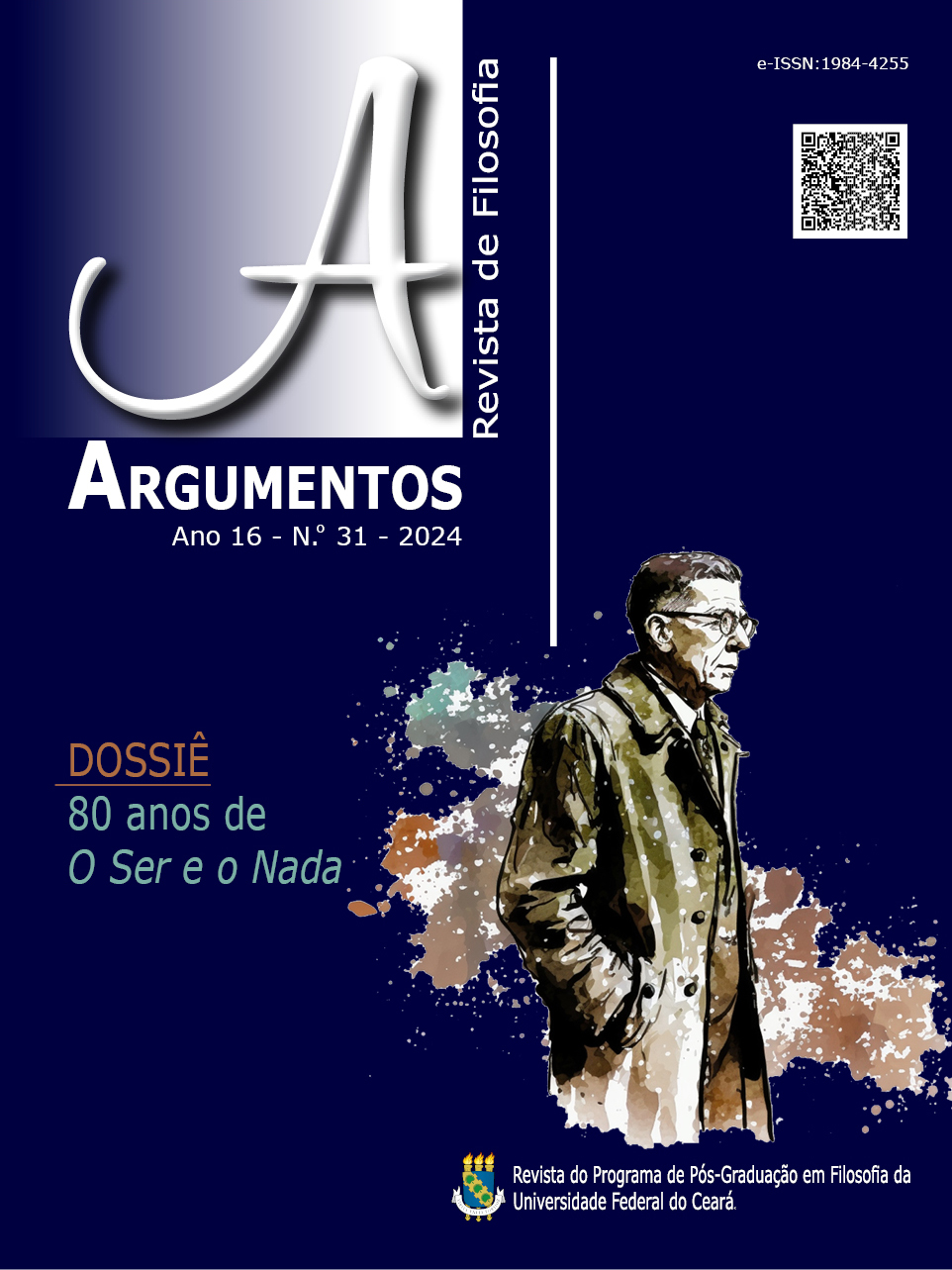Epistemic background of social ontology
DOI:
https://doi.org/10.36517/Argumentos.31.19Palavras-chave:
Social Ontology. Sociability. Idea. Common Sense. Image. Epistemology.Resumo
This article explores how epistemology plays a role within the realm of social ontology. My main claim is that every facet of the the social domain we deal with needs an epistemic framework and background in the construction of an ontology, contingent upon the fact that it has an ontological reality and existence. I think that two fundamentals make an significant contribution to this claim. The first of these is the notion of idea and its requisite foundation in social sphere, and the other is the concept concerning the common sense. Therefore, the initial part of this article centers on the treatment and examination of the the notion of the idea. My primary assertion in this section is to demonstrate that the concept of ide has a linguistic interconnection and that this connection needs a foundation within the social basis or context. In the subsequent fragment, where the concept of common sense is discussed, it is argued that common sense is a shared attribute among all individuals in common in the social field, and that it is emphasized that this shared common sense serves as an essential component making it possible to provide its epistemological foundations in the social context.
Downloads
Referências
ADORNO, Theodor. Minima Moralia. London: Verso, 2005.
DESCARTES, Rene. A Discourse on the Method of Correctly Conducting One’s Reason and Seeking Truth in the Sciences. New York: Oxford University, 2006.
ELDRED, Michael. Social Ontology Recasting Political Philosophy Through a Phenomenology of Whoness. Frankfurt: Ontos, 2008.
EPSTEIN, Brian. A Framework for Social Ontology. Philosophy of the Social Sciences, v. 46, n. 2, p. 147-167, 2016.
GALLOTTI, Mattia; MICHAEL, John. Objects in Mind. Perspectives on Social Ontology and Social Cognition. London: Springer, 2014. p. 1-13.
HATTAB, Helen. Descartes On Forms and Mechanisms. New York: Cambridge University, 2009.
IKAHEIMO, Heihhi; LAITINEN, Arto. Recognition and Social Ontology: An Introduction. Recognition and Social Ontology. Boston: Brille, 2011. p. 1-21.
LENNON, Thomas M. Locke and the Logic of Ideas. History of Philosophy Quarterly, v. 18, n. 2, p. 155-177, abr./2001.
LOCKE, John. An Essay Concerning Human Understanding. Oxford: Clarendon, 1975.
MARKIE, Peter. The Cogito and its Importance. In: COTTINGHAM, John (Ed.). The Cambridge Companion to Descartes. New York: Cambridge University, 2005.
MOORE, Terence. Locke’s Parrot. Think, Autumn, n. 1, p. 35-44, 2009.
PLATON. The Republic of Plato. New York: Basic Books, 1991.
PRISELAC, Matt. Locke’s Science of Knowledge. New York: Routledge, 2017.
PUTNAM, Hilary. Representation and Reality. Cambridge: MIT, 1988.
ROOT, Michael. Philosophy of Social Science the Methods, Ideals, and Politics of Social Inquiry. Cambridge; Oxford: Blackwell, 1996.
SEARLE, John R. Social Ontology: Some Basic Principles. Papers, n. 80, p. 51-71, 2006.
SPALLANZANI, Mariafranca. First Philosophy, Metaphysics, and Physics. In: ANTOINE-MAHUT, Delphine; ROUX, Sophie (Eds.). Physics and Metaphysics in Descartes and in His Reception. New York: Routledge, 2019.
STEKELER, Weithofer P. Intuition, Understanding, and the Human Form of Life. In: IKÄHEIMO, Heikki; LAITINEN, Arto (Eds.). Recognition and Social Ontology. Boston: Brill, 2011. p. 85-117.
Downloads
Publicado
Versões
- 2025-03-28 (2)
- 2024-01-15 (1)
Como Citar
Edição
Seção
Licença
Copyright (c) 2024 Argumentos - Revista de Filosofia

Este trabalho está licenciado sob uma licença Creative Commons Attribution 4.0 International License.
Autores que publicam nesta revista concordam com os seguintes termos (SOBRE COPYRIGHT E POLÍTICA DE ACESSO LIVRE):
1. Autores mantém OS DIREITOS AUTORAIS concedidos à revista OU Direito de Primeira Publicação, com o trabalho simultaneamente licenciado à Atribuição de Licença Creative Commons (CC BY) que permite o compartilhamento dos trabalhos com reconhecimento de autoria e publicação inicial nesta revista.
2. Autores têm permissão para aceitar contratos, distribuição não-exclusiva da versão do trabalho publicada nesta revista (por exemplo: publicar no repositório institucional ou como um capítulo do livro), com reconhecimento de autoria e publicação inicial nesta revista.
3. Autores têm permissão e são estimulados a publicar e distribuir seu trabalho on-line (por exemplo: em repositórios institucionais ou em sua página pessoal) mesmo durante o processo editorial, haja visto que isso pode aumentar o impacto e citação do trabalho publicado.




.jpg)










._._3.png)
1.jpg)
._._._.png)
